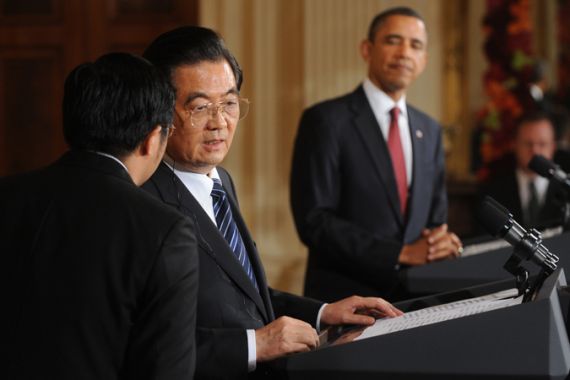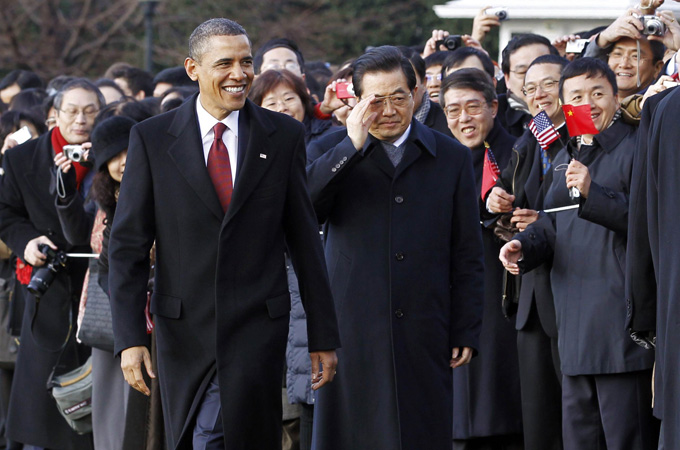China’s Hu admits rights failings
At meetings with US counterpart, Chinese leader says “a lot still needs to be done” on human rights in his country.

 |
| Hu Jintao, centre, is on a four-day visit to the United States [EPA] |
The US and China discussed the contentious issue of human rights amid the pomp and ceremony of a state visit that Barack Obama, the US president, has said will lay the foundation for deeper prosperity between the two nations.
Obama said he had raised various rights issues with Hu Jintao, his Chinese counterpart, during meetings on Wednesday and that the US and China had agreed to move ahead with a dialogue in that field.
“I have been very candid with President Hu about those issues,” he said.
“History shows that societies are more harmonious, nations are more successful and the world is more just when the rights and responsibilities of all nations and all people are upheld.”
When a reporter asked Hu about human rights, at first he did not respond, but when a second reporter followed up, Hu blamed translation and technical problems for his initial silence.
“China is always committed to the protection and promotion of human rights,” he said.
But Hu also acknowledged that “a lot still needs to be done” and that Beijing was willing to have a dialogue on the issue.
Obama said he had urged China to engage in a dialogue with the Dalai Lama, Tibet’s exiled spiritual leader, and officials said he had also raised the issue of Liu Xiaobo, the imprisoned Nobel peace prize winner.
‘Work together’
Although reports of the first day of the four-day visit will be dominated by the human rights remarks, the two leaders sought to highlight the ties between the nations.
|
“We’ll continue to look for the value of China’s currency to be increasingly driven by the market to ensure no nation has an undue economic advantage” Barack Obama, |
“With this visit we can lay the foundation for the next 30 years,” Obama said at a grand arrival ceremony outside the White House.
“We have an enormous stake in each other’s success. In an interconnected world, in a global economy, nations including our own will be more prosperous and more secure when we work together.”
Hu in return said that since Obama took office “our co-operation in various fields has produced fruitful results and our relations have achieved new progress”.
He also said co-operation between the US and China should be based on mutual respect, and that the two countries should respect each others’ interests and development paths.
In a clear sign of where the mutual interests lie, the White House unveiled a series of commercial deals with China worth $45bn, including a $19bn deal for 200 Boeing air planes. Boeing said the aircraft will be delivered over the three-year period 2011-2013.
The various deals will altogether support up to 235,000 jobs in 12 US states, according to US officials. In addition to the Boeing deal, China will also invest in US exports from agriculture, telecommunications and technology companies, including General Electric, Honeywell and Navistar.
‘Resetting relations’
A separate deal was also signed to increase co-operation between the two countries on nuclear security. The deal, signed by officials from both countries, will see the establishment of a jointly financed nuclear security centre in China.
 |
| The two leaders discussed difference over the valuation of China’s yuam currency [Reuters] |
The venture is aimed at training to improve security at nuclear facilities and accounting on nuclear materials. US officials also hope to hold joint exercises on responding to nuclear disasters and to share nuclear detection techology.
Al Jazeera’s Patty Culhane, reporting from the White House, said the presidents’ meeting was aimed at “resetting relations”, as the two countries were trying to “find their footing in a more equal relationship”.
“From the Chinese perspective, they have the argument of ‘We hold a lot of your debt, in fact you [US] owe us almost about $900bn'”, she said.
“The US argument to the Chinese is ‘You need us just as much because you need to be able to sell your goods in our open market place'”.
The US exports $100bn of goods and services to China, making the country its largest trading partner after Canada and Mexico.
China is also the largest foreign holder of US debt.
Currency concerns
The two presidents acknowledged “differences” over China’s yuan currency, which the US has accused China of deliberately devaluing to secure advantages for itself.
Obama said in news conference that the yuan “remains undervalued and there needs to be further adjustment”.
“We’ll continue to look for the value of China’s currency to be increasingly driven by the market to ensure no nation has an undue economic advantage,” he said, adding that this should also be in China’s interest, to prevent inflation from looming.
Hu referred without elaboration to “some disagreements” in the economic and trade area, which he said the two countries would aim to resolve.
The US exports $100bn of goods and services to China, making the country its largest trading partner after Canada and Mexico.
China is also the largest foreign holder of US debt.